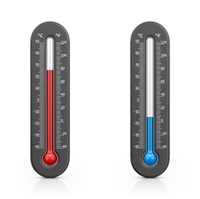3.7 Temperature regulation
 Antipsychotics can affect the ability to regulate temperature. Body temperature may rise above the normal (hyperthermia) or fall (hypothermia) depending upon ambient temperature (poikilothermy1) and activity.
Antipsychotics can affect the ability to regulate temperature. Body temperature may rise above the normal (hyperthermia) or fall (hypothermia) depending upon ambient temperature (poikilothermy1) and activity.
Body temperature is regulated by the hypothalamus and may be mediated at the serotonin 5HT2 receptor. Transmission at adrenergic alpha2 receptors may also be relevant since blockade of these receptors can inhibit response to cooling (eg vasoconstriction and shivering).
Factors which increase risk
The risk of hypothermia is highest in the first few days after starting antipsychotic treatment or after increasing the dose.
In a cold environment, apathy and indifference may result in failure to take measures to protect against the cold. The elderly are especially prone to temperature changes.
Particular caution is advised if the patient is exposed to other factors that might affect body temperature such as strenuous exercise, extreme ambient temperature (and inability to control immediate environment or personal physical state eg with appropriate clothing), concomitant treatment with an antimuscarinic (anticholinergic)2 drug, and dehydration.
Risk-reduction measures
Monitoring body temperature after initiating treatment or after increasing the antipsychotic dose will detect problems with temperature regulation. Temperature monitoring may also be important in case of concurrent illness such as infection.
Treatment
Body temperature can be maintained by supportive care (eg choice of appropriate clothing, control of ambient temperature) until the risk reduces with continuing use of the antipsychotic.
In some cases it may be necessary to consider switching to an antipsychotic which is less active at the serotonin 5HT2 receptor or discontinuing antipsychotic treatment.